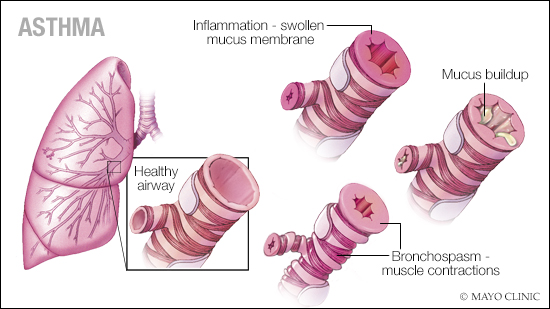Asthma is a global issue. It's estimated that more than 334 million people around the world have asthma. It's a chronic disease that makes it hard to breathe. Asthma often starts in childhood, but can develop in people of any age and is common in adults as well. Symptoms of asthma can range from mild to life-threatening.
Dr. James Li, a Mayo Clinic allergist, talks about the signs and symptoms of asthma in this Mayo Clinic Minute.
Journalists: Broadcast-quality video (1:00) is in the downloads at the end of this post. Please "Courtesy: Mayo Clinic News Network." Read the script.
"Asthma is a lower airway condition affecting the bronchial tubes. The typical symptoms of asthma would be shortness of breath, chest tightness, cough and wheezing," says Dr. Li.
During what's called an asthma exacerbation, the bronchial tubes tend to constrict.

"And there's also inflammation and swelling and mucus inside the bronchial tube, which can block the airflow," he says.
Everyone experiences asthma differently with different triggers.
"Pollen or mold in the air, it's often allergic asthma coexisting with allergic rhinitis, but also exercise, cold air and viral upper respiratory infections," Dr. Li says.
Bronchial inhalers and other asthma medication can bring quick relief.
"If someone is experiencing an asthma exacerbation and they have trouble sleeping, trouble completing a sentence or trouble walking on level ground, that really warrants immediate attention. And there's good treatment for it," he says.
Asthma symptoms may flare up due to a number of triggers. It's not clear why some people are affected and some are not. And there may be some hereditary and environmental factors that may increase a person's risk for developing asthma.
Risk factors for asthma may include:
- Hereditary - having a family member with asthma
- Allergies such as hay fever
- Obesity
- Smoking
- Exposure to secondhand smoke
- Exposure to fumes or chemicals
If you think you or your child may have asthma, seek medical treatment. Treating asthma early may prevent long-term lung damage and help keep the condition from getting worse over time
Related posts:
Related Articles








